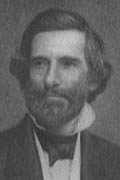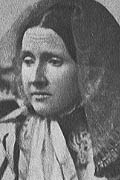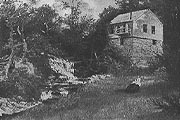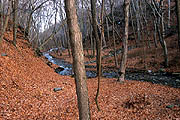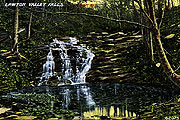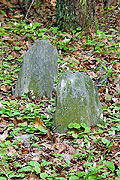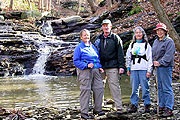|
|||
| Excerpts From "This Was My Newport"[1] by Maud Howe Elliot:
CHAPTER IV - Lawton's Valley: Eloping My first love affair had for its background the long, wooded valley with its dear brown brook swirling into silver around the stones and tree roots. The hero was the grandson of our neighbors at the "Redwood,'' a fine estate whose ancient lime trees had been brought home in a bottle from England and planted in front of the house. At this time our little township had a national reputation, for here was situated Portsmouth Grove, the Civil War military hospital where sick and wounded soldiers were brought to recuperate in our matchless climate. On a certain long July day, Mamma sat busy at her desk writing, writing, those endless manuscripts, kept in a certain black walnut chest, which every child knew it was his first duty to save in case of a fire. Upon Mamma thus occupied-perhaps with her lecture on Polarity or her poem The Flag-the youngest Tatterdemalion burst in with the request for the loan of a certain small green parasol with a "pinked" flounce, recently come in a trunk from Paris. Absently the request was granted and the child departed with no more than a word of thanks, while the mother once more took up her pen, and spliced the thread of thought so rudely broken. Firmly grasping the green parasol, the youngest daughter of the house passed out of it, and down to the Valley to keep a tryst with the boy from "Redwood." It was a serious test. The young people, aged respectively seven and eight, had decided to run away together. They sauntered through the Valley, past the three falls, across the brook, and over the salt meadows to the railroad track that edged the shore of the Bay at the point where the Portsmouth Asylum stood gray and weatherbeaten against the grayer Newport sky. On the barren hillside a few rods away, lay the Potter's Field, where the paupers who have died at the poor- house lie buried. At the head and foot of each grave is placed a gray slate from the stony hillside, but the slate bears no name nor date. The eloping couple paused in this forlorn corner of God's acre long to enough make the puzzling discover that the pauper grates were nameless, while those in the cemetery on the East Road all bore names and dates, and on: displayed a daguerreotype of the departed, neatly fitted into the marble stone. Now for the railroad ! The afternoon train was due, even now whistling as it neared the curve. Two pins, brought for the pur- pose, were carefully laid crosswise upon the tracks, and the Tatterdemalions stood back while the train thundered by. The engineer nodded from his cab, and saluted them with a screech of the whistle. In the dust of the departing train, they found the two pins-welded solidly together in the form of a Saint Andrew's cross. The omen seemed auspicious. It was at first very exciting to walk along the track, a proceeding to which nurses, governesses, and all elders unreasonably objected. The stretch from sleeper to sleeper was too long for Tatterdemalion legs, and after one or two attempts was given up for a steady pottering pace between the ties. The walk along the dayside from the poorhouse to Portsmouth Grove was full of adventures. At one point a huge black "python" raised its ugly head as it crossed the line within a few feet of them and slid hissing into the elder and bayberry bushes that bordered the track. The first objective was Portsmouth Grove itself, where the Providence boat stopped to take and leave passengers. Beyond that point the plan was vague. Two sentries pacing their beat at the entrance to the military hospital grounds crossed their bayonets above the young couple's heads and proceeded to chaff them. Then, relenting, the good- natured soldiers returned to their beat while the children wandered down the broad middle path between the oaks and the hospital tents to the boat-landing. One point of dread they touched: a place of torture, where, in a small shed, a culprit stood with water falling drop by drop upon his head. Was this a dream? It stands the clearest image in all the shifting picture of that day of days. At the landing, the first check came. The adventurers were again challenged, this time firmly. Tickets were demanded by the authorities, and, not being forthcoming, the children were forbidden to embark and ordered to "stand back." The steamer's name was the Perry Mail-always known by us as the "Merry Pail'"-but she seemed anything but merry as the small couple forlornly watched her cast off her big hawsers, beat the water into a white slather of foam with her paddles, and puff relentlessly away. The sun was setting, the long sweet day drawing to a close. Supper time had come and gone, and no supper offered. A young officer hurrying by stopped and spoke to the children. A kind hand was clapped on the shoulder of each. The boy and girl were under arrest; the fact was worth the growing-pains now becoming wellnigh intolerable in the short legs. At the entrance of the camp the young officer left the pair, with the charge: It was a long walk from Portsmouth Grove to Lawton's That was the worst of it all. The fact that Mamma had been badly frightened was brought sharply home by parents, elder children, neighbors and servants. The strongest memory of this memorable day is the surprise that anybody, especially so wonderful a person as Mamma, should have taken any especial interest in the success or failure of the children's plan to run away and see the world ! [1] This Was My Newport, Maud Howe Elliot , Published in 1944 by the Mythology Co, Cambridge, MA. |
 Old water mill located on property owned by Dr. Samuel Howe and his spouse, Julia Ward.This mill was powered by the water falling in Lawton Valley.
|
| [Search!] | [Survey] [Planning] [Projects] [Outreach] | [What's New!] |
|
Copyright © 1999-2003, REWHC. All Rights Reserved 235 have visited |
||


